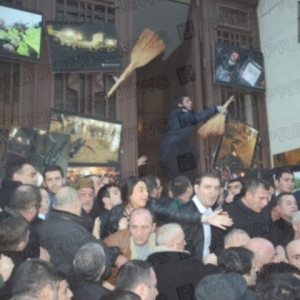
Armenian Foreign Minister Edward Nalbandian.
The Foreign Minister of Armenia, Edward Nalbandian led a chorus of criticism against views expressed by diplomats from EU member states ahead of the presidential elections. The diplomats, namely British Ambassador Katharine Leach and Polish Ambassador Zdzisław Raczyski’s had made mild criticisms and expressed hope for free and fair elections. Pro government politicians lined up to criticise the two Ambassadors and accusing them of interfering in internal affairs. The Foreign Minister then weighed in suggesting that the two Ambassadors had crossed the boundaries of diplomatic practise, with Nalbandian citing his experience as long time Armenian Ambassador to France to show how diplomacy should be done. Diplomatic circles in Yerevan are surprised by the audacity of this criticism given that Armenian diplomats in France, the United States and other countries are often involved in supporting candidates who are sympathetic to pro Armenian issues in the countries they are accredited to, whilst the Polish and British diplomats in Tbilisi were simply making comments about how the democratic process could be consolidated. More…
 Georgian civil society organisations had tough words for politicians following incidents at a protest in front of the National Library where President Saakashvili was due to speak. The International Society for Fair Elections and Democracy, Transparency International – Georgia, Georgian Young Lawyers’ Association and the Open Society – Georgia Foundation condemned the acts of violence that ensued. In their statement the four NGOs said
Georgian civil society organisations had tough words for politicians following incidents at a protest in front of the National Library where President Saakashvili was due to speak. The International Society for Fair Elections and Democracy, Transparency International – Georgia, Georgian Young Lawyers’ Association and the Open Society – Georgia Foundation condemned the acts of violence that ensued. In their statement the four NGOs said The OSCE/ODIHR Election Monitoring Mission issued an interim report on 7 February in which it described the first two weeks of the presidential Election Campaign in Armenia as “low-key and of limited visibility”. The Mission has strived to go through the motions of monitoring the campaign despite the somewhat bizarre circumstances that have surrounded this election.
The OSCE/ODIHR Election Monitoring Mission issued an interim report on 7 February in which it described the first two weeks of the presidential Election Campaign in Armenia as “low-key and of limited visibility”. The Mission has strived to go through the motions of monitoring the campaign despite the somewhat bizarre circumstances that have surrounded this election.
